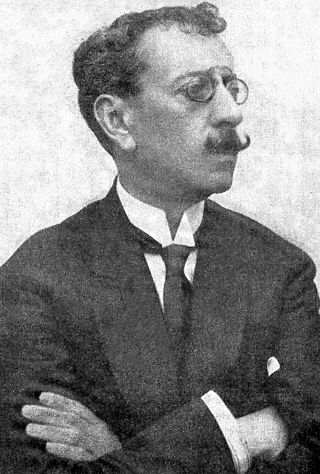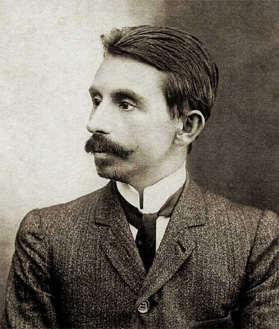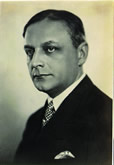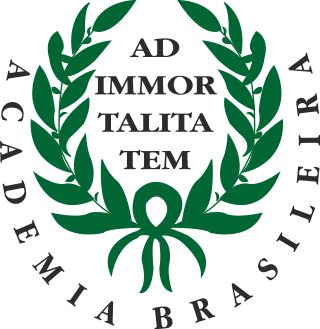
Olavo Brás Martins dos Guimarães Bilac, known simply as Olavo Bilac, was a Brazilian Parnassian poet, journalist and translator. Alongside Alberto de Oliveira and Raimundo Correia, he was a member of the "Parnassian Triad". He was elected the "Prince of Brazilian Poets" in 1907 by the magazine Fon-Fon. He wrote the lyrics of the Brazilian Flag Anthem.

Washington Luís Pereira de Sousa was a Brazilian politician who served as the 13th president of Brazil. Elected governor of São Paulo state in 1920 and president of Brazil in 1926, Washington Luís belonged to the Republican Party of São Paulo (PRP) and served as the last president of the First Brazilian Republic.

Euclides da Cunha was a Brazilian journalist, sociologist and engineer. His most important work is Os Sertões, a non-fictional account of the military expeditions promoted by the Brazilian government against the rebellious village of Canudos, known as the War of Canudos.
Oscar Sala, Italian-Brazilian nuclear physicist and important scientific leader, Emeritus Professor of the Institute of Physics, University of São Paulo.

Lygia Fagundes da Silva Telles was a Brazilian novelist and writer. Educated as a lawyer, she began publishing soon after she completed high school and simultaneously worked as a solicitor and writer throughout most of her career. She was a recipient of the Camões Prize, the highest literary award of the Portuguese language and her works have received honors and awards from Brazil, Chile and France. She was elected as the third woman in the Brazilian Academy of Letters in 1985 and held Chair 16.

Zélia Gattai Amado de Faria was a Brazilian photographer, memoirist, novelist and author of children's literature, as well as a member of the Brazilian Academy of Letters. Gattai wrote 14 different literary works, including children's books and her own personal memoirs have been widely published.

Sérgio Buarque de Holanda was a Brazilian historian, writer, journalist and sociologist. His greatest achievement was Raízes do Brasil, a landmark of Brazilian sociology, in which he developed the groundbreaking concept of the "cordial man" as the fundamental Brazilian identity. His son, Chico Buarque de Holanda is an accomplished singer-songwriter and novelist and his daughter Miúcha was also a famous singer. Buarque de Holanda was also a member of the Academia Paulista de Letras.

Adonias Aguiar Filho was a novelist, essayist, journalist, and literary critic from Bahia, Brazil, and a member of the Academia Brasileira de Letras.
Alfredo Bosi was a Brazilian historian, literary critic, and professor. He was a member of the Academia Brasileira de Letras, occupying Chair number 12. One of his most famous books is História Concisa da Literatura Brasileira, widely used in Brazilian universities in literature courses. Bosi also wrote several studies about Italian literature and about major Brazilian writers, as well as essays on the field of hermeneutics.

Ignácio de Loyola Brandão is a Brazilian writer, perhaps best known as the author of the dystopian science-fiction novel Zero; the story of Brazil in the 1960s under a totalitarian regime. In 2008, he was awarded the Prêmio Jabuti for his novel O Menino que Vendia Palavras.

Eduardo Giannetti da Fonseca is a Brazilian economist and author, educated at the University of São Paulo, with specialization in Social Science, Economics, Administration, and Accounting.

Teodoro Fernandes Sampaio was an Afro-Brazilian polymath and public intellectual who worked as an engineer, geographer, politician, and historian.

Wallace Cochrane Simonsen was a Brazilian banker and the first mayor of São Bernardo do Campo, one of the cities pertaining to the Metropolitan Region of São Paulo, most specifically the ABC Region.

Lêdo Ivo was a Brazilian poet, novelist, essayist and journalist. He was member of the Brazilian Academy of Letters, elected in 1986.
Sérgio Paulo Rouanet was a Brazilian diplomat, philosopher, essayist, and scholar. He was the national Secretary of Culture between 1991 and 1992, and in his tenure he created the Lei de Incentivo à Cultura, a tax credit law for companies and citizens that sponsor cultural activities, which became known as Rouanet Law.
Sábato Antonio Magaldi was a Brazilian theater critic, playwright, journalist, teacher, essayist and historian.

Cândido Motta Filho was a Brazilian lawyer, professor, journalist, essayist and politician.
Francisco Inácio Marcondes Homem de Melo (1837-1918), also known as the Baron Homem de Melo, was a Brazilian lawyer, historian, cartographer, politician and professor. He was born in Pindamonhangaba in 1837. He studied law in Sao Paulo, and upon graduation returned to his birthplace, where he was elected President of the City Council. Through the 1860s and 1870s, he served in various responsible positions in São Paulo, Ceará, Rio Grande do Sul and Bahia. In Rio Grande do Sul, in just three months he managed to raise, organize and dispatch the 3rd Army to the theater of war in Paraguay, at the behest of General Manuel Luís Osório.

Pedro Calmon Moniz de Bittencourt was a Brazilian professor, politician, historian, biographer, essayist and orator.
















